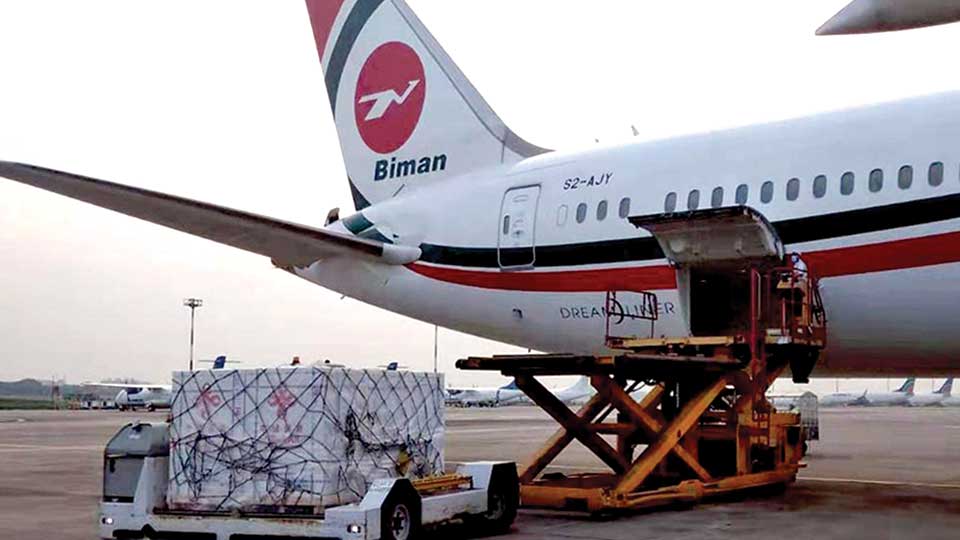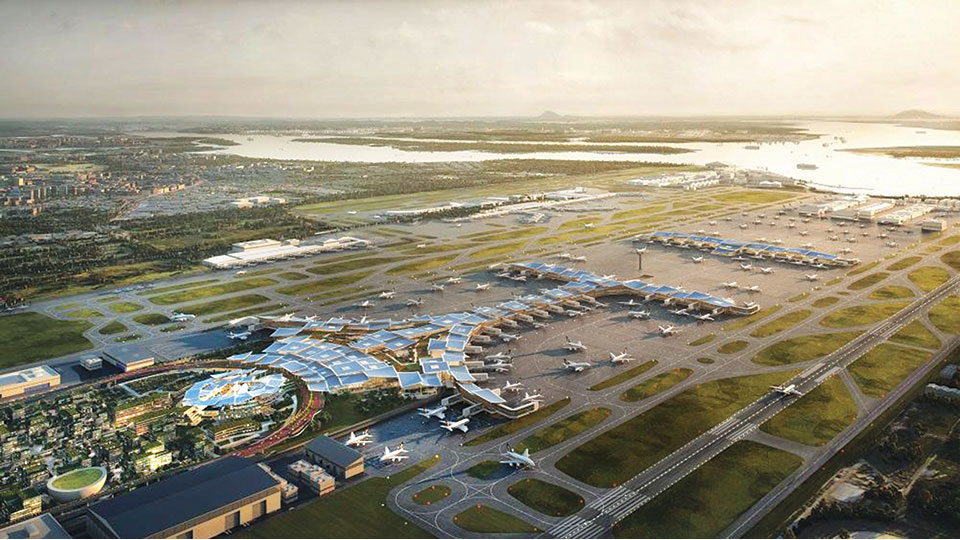
Dhaka : Biman Bangladesh Airlines has achieved the highest cargo revenue in its 55-years history, underscoring the growing importance of air freight in the country's economy and the airline's evolving role as both national carrier and ground handler at all Bangladeshi airports.
According to Shakil Meraj, Director of Cargo at Biman, the airline earned BDT 1,534.63 crore in cargo revenue in fiscal year 2024-25 against a target of BDT 1,207 crore, outperforming its goal by 27 percent. This surpasses the previous year's figure of BDT 1,229.65 crore against a target of BDT 1,190 crore.
"These figures reflect only Dhaka's Hazrat Shahjalal International Airport, the country's primary air cargo hub," Meraj said while talking to The Bangladesh Monitor. "Our achievement is not just a revenue milestone - it is proof of how Bangladesh's air cargo industry can adapt and thrive even in the face of regional and global challenges."
Fast fashion fuels growth
The backbone of Bangla-desh's air cargo business remains its ready-made garment (RMG) industry, which contributes 85 percent of the nation's export earnings. While most garments are shipped by sea, the higher-value "fast fashion" segment depends on air freight to meet its ultra-short timelines.
"Brands like Zara and other premium retailers demand delivery within 72 hours of production. Fall fashion items cannot wait until winter. This is where air cargo becomes indispensable," Meraj ex-plained.
Zara, through its parent company Inditex, is the single largest buyer of Bangladesh's air shipment cargo. Biman transports these shipments directly to Zaragoza, Spain, from where Inditex distributes them to more than 190 outlets worldwide.
Adapting to India's transshipment ban
A major challenge arose after India imposed a ban on transshipment of goods through its territory. Previously, Inditex aircraft flew to Delhi, from where Bangladeshi RMG shipments were trucked across the border - a long and costly route.
"To avoid massive losses for exporters, we launched a secondary air cargo hub in Sylhet on April 27, 2025," Meraj said. There, Biman now handles thrice-weekly Airbus A330 freighter flights to Zaragoza. "This not only reduced costs and transit times but also saved Bangladesh's premium export orders. Our export cargo market was protected."

Setting up the Sylhet hub required new infrastructure, including an explosive detection system (EDS) scanner provided by the Civil Aviation Authority of Bangladesh (CAAB), and specialized training for Biman staff.
Expanding capacity with new terminals
At present, Biman's cargo handling capacity stands at 600-700 metric tons of exports and 400-500 metric tons of imports daily at Hazrat Shahjalal International Airport in the capital. Its export terminal alone processes about 210,000 metric tons annually.
However, the opening of new export and import facilities under Dhaka Airport's third terminal project is expected to triple Biman's handling capacity. "This is a game-changer," said Meraj. "We are not just preparing for today's demand but building capacity for tomorrow's opportunities."
Biman has already recruited 100 new staff, with 200 more in the pipeline, to support the expansion. Equipment upgrades include 10 heavy-duty forklifts, 17 narrow-aisle trackers for warehouse mobility, 150 hydraulic hand trolleys, and six apron vehicles to meet European cargo security requirements.
Unique storage solutions, 24/7 service
To ease congestion at its import warehouse, which covers 158,000 sqft, Biman now offers a 72-hour free storage facility - compared to the international standard of 24 hours.
"Imports arriving on Thurs-days often remained idle under the open sky beyond the warehouse until Sunday due to weekends, causing damage and backlog. By offering three days of free storage, we ensure valuable goods, such as RMG raw materials, accessories, and electronics, are protected inside the warehouse," Meraj said.
Biman's cargo services operate around the clock, 365 days a year. "Our logistics network never sleeps. The economy depends on it," he emphasized.
Partnerships, global certifications
Biman currently handles cargo for 35 scheduled airlines daily, in addition to 200-230 monthly charter freighters, including those from China, carrying e-commerce goods for platforms like Daraz, Alibaba, and Amazon, as well as raw materials for local industries.
To extend its global reach, Biman has signed special prorate agreements and codeshares with Gulf Air, Air France-KLM, British Airways, Etihad, and Qatar Airways. "This allows us to serve destinations where Biman itself does not fly," Meraj noted.

The airline also holds critical global certifications - including IATA's Ground Handling Safety Audit, ACC3 (mandatory for cargo bound for Europe), and RA3 - ensuring compliance with international safety and security standards.
New cargo horizons: Chattogram, Cox's Bazar
Looking ahead, Biman is working with CAAB to activate Chattogram airport for cargo operations by year-end. With 11 export processing and economic zones located nearby, the move will eliminate the need for trucking cargo to Dhaka.
Beyond Chattogram, Cox's Bazar airport is also being developed for international cargo. "From Cox's Bazar, Kunming is only an hour away, and hubs like Guangzhou, Chengdu, Shanghai, and Hong Kong are within easy reach. This could open a new chapter in Bangladesh-China trade," Meraj said.
"Logistics is the Wheel of the Economy"
Meraj, who assumed office as Director of Cargo on February 24, 2025, sees logistics as central to Bangladesh's economic stability. "If logistics stops, the economy halts. Our manpower, trained by the Bangladesh Airlines Trai-ning Center - the only EASA-approved center in the country - works tirelessly to keep this wheel moving."
The cargo division is audited annually by international airlines and renews its certifications every two years, en-suring continued global re-cognition.
Despite the success, Meraj believes the sector remains underutilized due to restrictions on transfer and transit cargo, which customs law technically allows but has been verbally restricted since 2023. "We are in discussions to relaunch it. If implemented, it could significantly boost both cargo volume and revenue."
For now, Biman's record-breaking performance stands as a testament to how strategic planning, international partnerships, and infrastructural growth can turn challenges into opportunities for Bangladesh's aviation and logistics sector.












